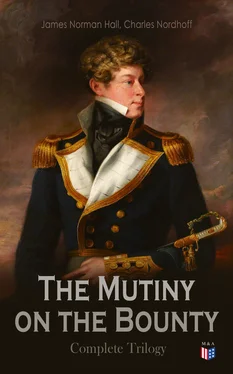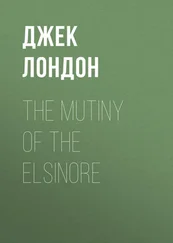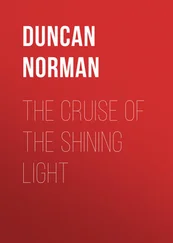“Patient?” Stewart remarked. “Well, I could put up with three years here—or with four or five! And Byam is a lover of the Indian life.”
“Damn the Indian life,” said Morrison without a smile. “Who knows what wars are going on, what chances for prize money and promotion we are missing!”
I went to sleep with a light heart that night, for our escape seemed a certainty, and the prospect of a year or two among the Indians was far from displeasing. At dawn I saw Peggy’s light double canoe, paddled by half-a-dozen stalwart fellows, set out for Tetiaroa, and all through the forenoon I watched every sign of the weather anxiously. Nature herself now took a hand against us. The day turned chilly and films of cloud began to stream seaward off the mountains. We were in the lee of the high land, and Matavai Bay remained still as a lake, but the wind had chopped around to the south and was blowing up one of the boisterous southerly storms the Indians call maraai. Gazing out to sea, I perceived the line of whitecaps at the end of the lee, and knew that as long as the south wind held, no canoe would even attempt to return from the island north of us.
Day after day the strong south wind blew, while we traded for our strange cargo. Hogs, fowls, dogs, and cats came on board till the ship resembled a menagerie, and finally the bull and the cow left on Tahiti by Captain Cook. Goats skipped about comically on deck, among mounds of taro, sweet potatoes, and yams. And little by little our hope, which had run so high, began to change to fear. There were signs that Christian was nearly ready to sail, and Peggy’s face, when she visited her lover on board, grew haggard with anxiety. I shall not dwell on our suspense. It is enough to say that on the ninth day the wind shifted to northeast and brought our sailing canoe in, four hours after the shift. This was at noon and all was arranged for our escape the same night, but now at the last moment fate turned against us once more. At two o’clock in the afternoon Christian ordered the anchor up and, close-hauled on the starboard tack, the Bounty sailed out of Matavai Bay.
The months from June to September of that year, 1789, are a nightmare in my memory, and since they have little to do with the main thread of this narrative, I shall give them no more space than they deserve.
In spite of our hostile reception when we first visited Tupuai, Christian had determined to settle on that island. We were now southbound, like modern Noahs on our Ark, with livestock of various kinds to increase and multiply on the island, and even a few Indian Eves to become the grandmothers of a new race—half white, half brown. Christian’s Maimiti was on board, and Young’s Taurua; and Alexander Smith, distrustful of the ladies of Tupuai, had persuaded Bal’hadi to accompany him. Nor was any great degree of persuasion necessary, for the Indians were passionately fond of travel and adventure of any sort. Long after Tahiti had disappeared below the horizon north of us, it was discovered that we had on board nine Indian men, twelve women, and eight boys, most of them stowaways.
Our reception on Tupuai was at first friendly, owing to the Tahitian passengers, who explained our desire to settle on the island. With incredible labour we hauled the ship up on land and built thatched shelters to protect her decks from the sun. We then built a fort, on a point of land purchased from one of the chiefs, and surrounded it with a moat twenty feet deep and twice as wide, all hands, including Christian himself, taking part in the work. The men murmured much at this truly Herculean labour, but Christian’s foresight was soon evident. Our goats, loosed to increase among the mountains of the interior, descended on the taro gardens of the Indians, which they cultivate and water with infinite pains. Unable to capture or kill the wary animals, the people came to us, asking us to shoot them with our muskets. When we refused, explaining that the progeny of the marauders would provide an important supply of food, the Indians at first murmured and then broke out in open hostility, declaring that they would never cease their efforts until we were either exterminated or driven from the island for good. Time after time they attacked our fortress furiously, only to be driven off by the fire of our four-pounders and swivels, and before long it became impossible to venture outside save in strong parties, heavily armed. Our lives grew insupportable; even the hardiest among us wearied of the constant fighting, and early in September, perceiving that all hands were heartily sick of the place, Christian assembled the lot of us and called for a show of hands. All were for leaving Tupuai; sixteen expressed a desire to be left on Tahiti, and the rest wished to sail away with the Bounty to search for some uninhabited island where they might settle in peace. On being informed of our decision to leave Tupuai, the Indians agreed to cease hostilities while we launched and watered the ship, and after a week of labour such as falls to the lot of few men, we got the Bounty launched, her sails bent, and water and stores aboard. At the last moment, on the verge of leaving this ill-omened place, we nearly lost the ship in a tremendous squall which made up unperceived during the night. As it was, we lost the spare gaff of the driver and all our spare topgallant yards.
At daybreak, with a fresh breeze at east, we weighed and sailed out through the narrow passage, heartily glad to be clear of a place where we had met with nothing but misfortune and strife, and five days later, after an agreeable voyage, we were at anchor once more in Matavai Bay. The following men had decided to remain on the ship:—Fletcher Christian, Acting Lieutenant; John Mills, Gunner’s Mate; Edward Young, Midshipman; William Brown, Gardener; Isaac Martin, William McCoy, John Williams, Matthew Quintal, and Alexander Smith, Able Seamen.
The rest of the Bounty’s company had elected to remain on Tahiti. I was overjoyed at this sudden change in my fortunes, as were Stewart and Morrison. My old friend Hitihiti was among the first of the Indians to come off to us, and when I informed him that I hoped to go ashore and make my home at his house, his face beamed with smiles. As he had come out in a double canoe large enough to freight all my belongings ashore, I lost no time in asking Christian’s permission to leave the ship. I found him at the main hatch, superintending the division of the muskets, cutlasses, pistols, and ammunition, of which each man was to have his share.
“By all means,” he said, looking up from the paper in his hand. “Go ashore whenever you like. And take a musket with you and a supply of lead to mould bullets. We are so short of powder that I can give only a few charges to each man. You will stop with Hitihiti, of course?”
“That is my intention, sir.”
“I shall see you to-night, then. I wish to speak to you and to Stewart—I shall ask him to be there an hour after sundown.”
My hammock man and his lusty Indian wench lent me a hand to get my things out of the berth, and after a farewell glance about the Bounty’s decks, and a silent handshake with Edward Young, I followed my belongings into Hitihiti’s canoe.
It was like a homecoming to return once more to the house of my taio, to greet Hina and her husband, and to see Hitihiti’s grandchildren running to welcome me. I had lived so long among these kind people that they seemed joined to me by ties closer than those of mere friendship.
When I had stowed my belongings and precious manuscript I became at once the centre of a circle of all ages, eager to hear the story of our adventures. I recounted at length, in the Indian tongue, the history of our attempt to settle on Tupuai, and ended by expressing some sympathy with the people of that island, who, after all, had done no more than repel what they considered an invasion of their home. Hina shook her head indignantly.
Читать дальше











